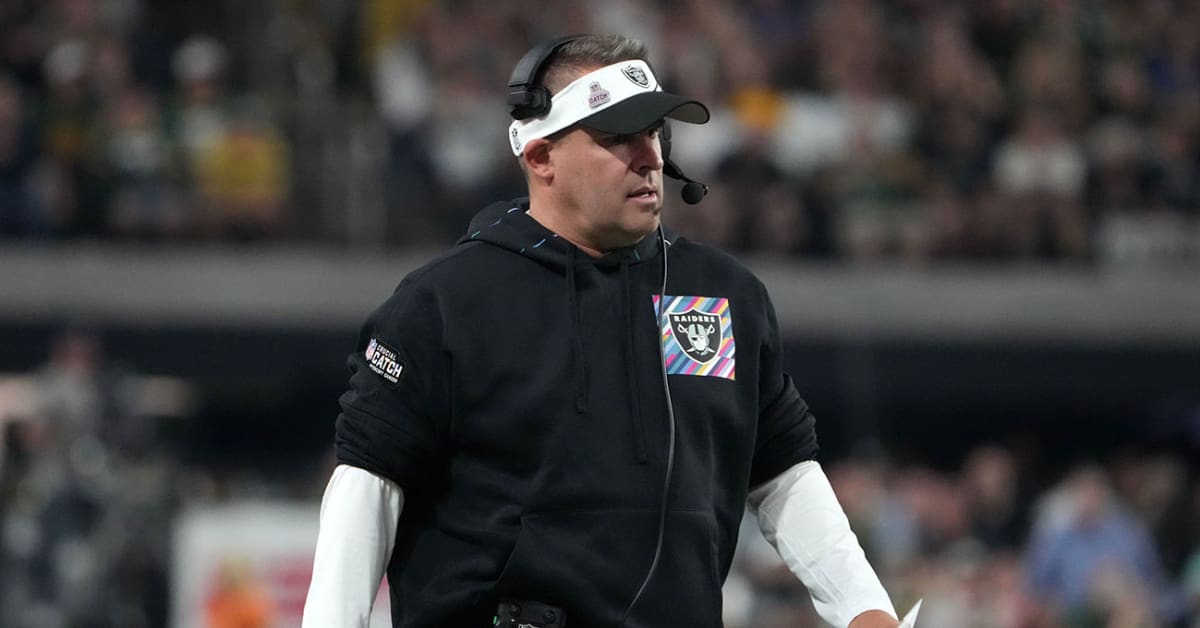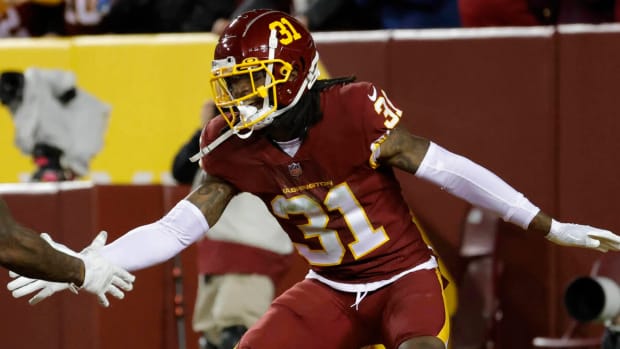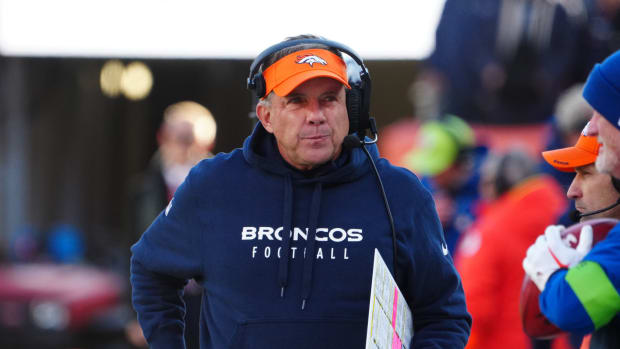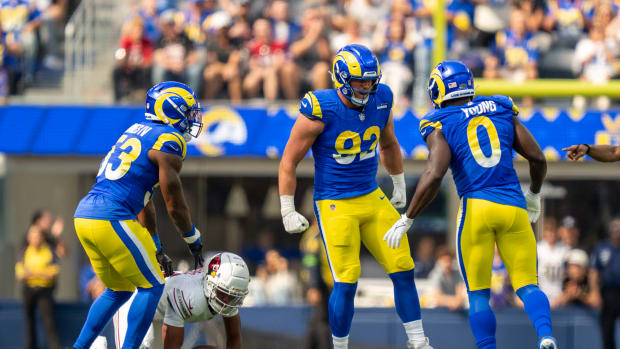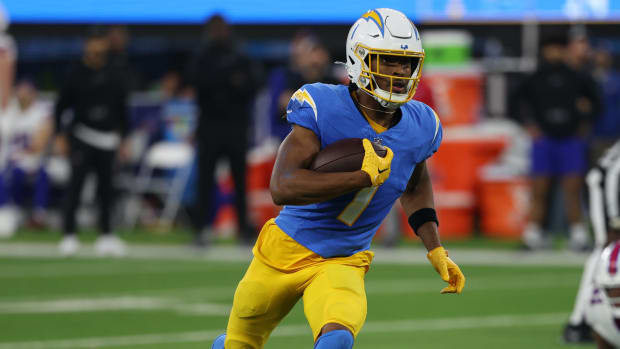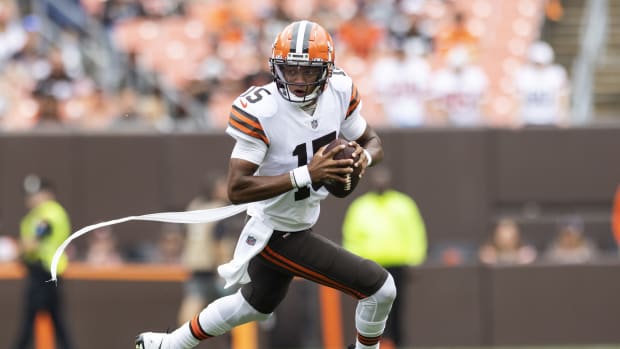Josh McDaniels Needs to Prove He Can Win Without Tom Brady
There is a coach in this weekend’s Patriots game who needs to prove he can win without Tom Brady, but it isn’t Bill Belichick. It is the Raiders’ Josh McDaniels.
McDaniels’s Raiders are 2–3. He is 19–31 in his head coaching career. He has never had a winning season. He is a rare head coach who’s had personnel power in each of his first two jobs (in Denver and Las Vegas), so it is hard to argue that he has been a victim of circumstance. There is no doubt McDaniels is a terrific football coach. But there are real doubts about whether he is a good NFL head coach.
McDaniels is a highly regarded quarterbacks coach, but how much of that reputation was built by coaching Brady after he was already a star? McDaniels spent a first-round pick on Tim Tebow, who was not an NFL-caliber quarterback. He spent one season as an offensive coordinator outside of New England, with the Rams; that year, Sam Bradford had his worst season as a starter.

As McDaniels faces his mentor in Week 6, the coach in his second year at his second job still has a lot to prove.
Kirby Lee/USA TODAY Sports
In Vegas, McDaniels chose to pivot from Derek Carr to Jimmy Garoppolo; in time, we will learn whether Garoppolo is a better fit for McDaniels’s offense or merely a more comfortable fit for McDaniels.
McDaniels is undeniably smart, and smart football minds have considered him a prime head-coaching prospect for many years. He might prove them right. But to this point, he has not really accomplished anything in his career without Brady on the field. (Brady has agreed to a minority ownership stake in the Raiders, but he can’t do much for McDaniels from the owners’ box.)
Belichick, meanwhile, coordinated defenses for two Super Bowl champions and a runner-up before he ever met Brady. He went 11–5 with Matt Cassel. He won a Super Bowl when Brady was learning to be great but wasn’t yet. They then won five more together—and we do mean together.
Belichick’s Patriots are 1–4 and toothless. He is still a brilliant strategist, but in recent years he has been a lousy personnel chief. The offense lacks playmakers and the offensive line is weak, which means quarterback Mac Jones often has to make something out of nothing, either with his feet or his arm, and that is not Jones’s game at all.
Against Dallas in Week 4, Jones committed three turnovers: He was forced to scramble and got stripped; he scrambled right and forced a pass he does not have the arm strength to make, to the left boundary; and he floated another pass to the sideline. He threw two more picks and had another fumble the next week against New Orleans. For Jones to succeed in the NFL, he needs a sound pass-blocking line and receivers who can punish defenders who gamble. He has neither. That gives him no chance to pick apart defenses, which is his strength. Frustration has led to desperation, which has turned Jones from a savvy, disciplined player to a careless one. As a rookie, Jones completed 67.6% of his passes and was intercepted once every 40 attempts. Now, in his third year, he is completing 62.5% of his passes and throwing an interception once every 27 attempts.
The result is a rare Belichick team where the whole is even less than the sum of its parts.
Belichick is 71. It now seems likely that he will never win another playoff game, let alone another Super Bowl. This will always be grist for the critics who say he won only because he had Brady, but that doesn’t mean the critics are correct.
Yes, Belichick has won only one playoff game without Brady (in 1994, when he and Vinny Testaverde led the Browns past the Patriots). He won all six of his Super Bowls with Brady. But only three coaches have ever won Super Bowls with more than one starting quarterback: Joe Gibbs, Bill Parcells and George Seifert. Let’s look at how they did it.
Seifert won his first with Joe Montana and his second with Steve Young, both of whom he inherited from Bill Walsh. So yeah, he won with two starting quarterbacks, but they were both Hall of Famers who were on the roster when he took over.
Gibbs won three Super Bowls in Washington with three starters: Joe Theismann, Doug Williams and Mark Rypien. That is an incredible achievement—but not as incredible as it seems today. Gibbs coached in a run-first era. Quarterback was the most important position on the field, but it was not nearly as important as it is now, and so having a great one was not as crucial to team success. In those three Super Bowl wins, Washington ran the ball 132 times and passed it just 86.
Parcells won Super Bowls with two Giants quarterbacks: Phil Simms and, when Simms got injured, Jeff Hostetler. Very impressive—but again, look at the era. In Parcells’s two Super Bowl wins, the Giants ran the ball 77 times and threw it 57. They won with ball control and (primarily) because of a stifling defense that was, of course, coordinated by Belichick.
That formula worked then. It hasn’t worked very often in the past 30 years. Only one man has won two Super Bowls with offenses built around two different quarterbacks: Seifert.
Brady’s post-Belichick career was better than Belichick’s post-Brady career. But historically, it is easier for a great quarterback to win with a new coach than for a great coach to win with a new quarterback. Peyton Manning won Super Bowls with two coaches and played in Super Bowls with four. Ben Roethlisberger won Super Bowls with two coaches.
Now, if you want to argue that Brady was a bigger factor in New England’s success than Belichick, go ahead. It’s a reasonable argument. But they were both enormous factors, and that will always be true, no matter how many pick-sixes Jones throws.
Belichick’s current team is not good, but most legendary NFL coaches end their careers with teams that are not good. McDaniels—at 47 years old, in his second year in his second job—should at least be beating bad teams consistently.
In his first year in Denver, McDaniels led the Broncos past the Patriots to improve to 5–0, and he was famously exuberant on the field afterward. At the time, he seemed like the NFL’s next great coach. A year later, he seemed like an overconfident Belichick wannabe. Which is he?
































